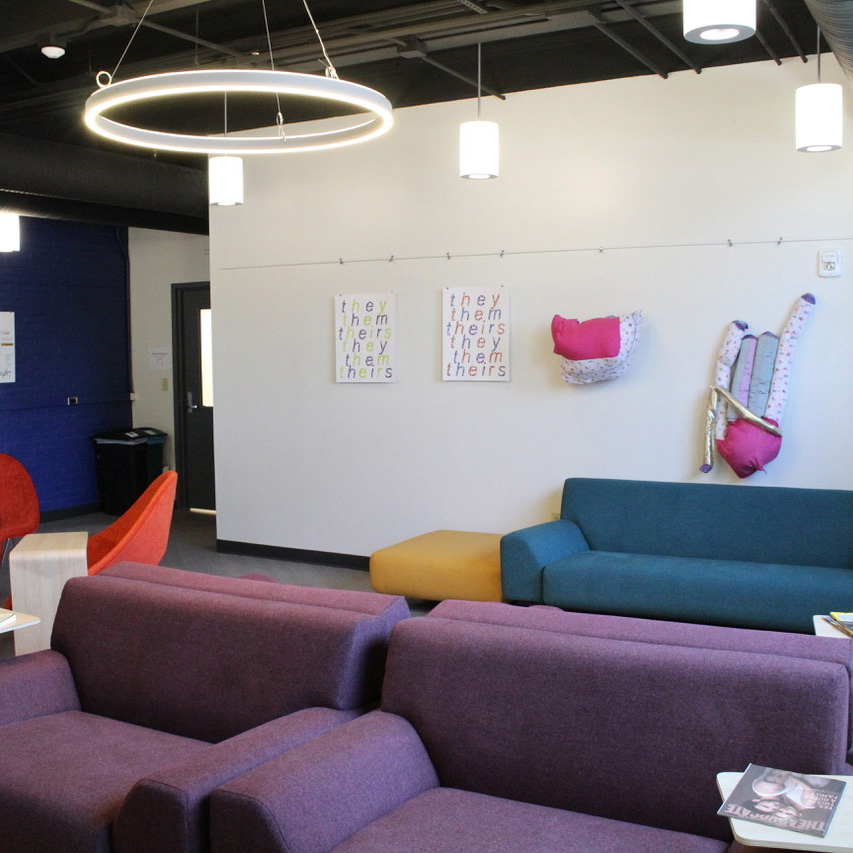
The Office of LGBTQ Resources has begun operating out of its new location at Founders Hall, a larger space with two new all-gender restrooms, as it moves toward expanding resources for Yale students in the LGBTQ community.
The office announced the move from its previous location at 40 Ashmun St. last semester, but construction took 57 days to complete, according to Associate Director Andrew Dowe. The new space is also fully accessible to those with disabilities and includes a lounge, kitchen and common room that doubles as a space for viewing films. With the expanded space, the office plans to bolster its programming and allow students to create and hold additional events in the building this year.
“We can provide all kinds of spaces for students, as well as a space and resources for members of the community to realize, to create and to put on programming and events they would like to see on campus,” Dowe said.
Some of the expanded programs include Queer Brunch, a series of brunches that will now be held more frequently and with food cooked in the new kitchen. Additionally, Beyond the Binary, a discussion series considered a safe space for students to freely talk about questions of gender identity, will meet on a weekly basis.
The new office was designed with community needs in mind, from total accessibility and private meeting spaces to multiple gender-neutral bathrooms — all with the goal of creating a space for students to work in a relaxed environment. The office also has a new feature, known as the Qloset, which will function as a clothing exchange for trans and nonbinary students. The clothes are donated by the Yale community and are available to any student free of charge.
Lola Hourihane ’20, a member of Yale’s trans community, said they feel excited about the prospect of Qloset and the ability to hold additional programming in the new space.
“As a co-director of VOKE Spoken Word, I am very excited to use the new office space for one-on-one workshops,” Hourihane said. “We also have equipment in the office for open mics and other performances, which allows us to bypass some space-reservation hassle.”
Dominic Schnabel ’19 characterized the move as “a huge upgrade,” noting that the old location on Ashmun Street was off the beaten track for many students. Schnabel said that because the center is now located on Science Hill and on the Yale Shuttle’s Blue Line, students can stop by the space on their way to and from classes.
Schnabel added that Benjamin Franklin and Pauli Murray colleges are directly across the street from the office, and people who go up to explore the new colleges may also tour the new center while they are in the area. Hourihane echoed the sentiment about reaching the center, calling the trip to the center a “lovely walk to break up the day.”
“I love that it’s open from noon until 10 p.m. every day,” Hourihane said. “We now have a comfortable and private space where queer students can come and chill in a space made for them, without encroaching on someone’s office space.”
Current directors of the Office of LGBTQ Resources have their own individual offices separate from the common rooms in the new location. Schnabel highlighted that the kitchen and dining area doubles as a multipurpose room, where this fall they have held Bluebooking, tea and dance events.
Schnabel said he is glad that groups such as VOKE Spoken Word are able to have an even larger venue, which may allow them to attract more members. He added that he feels “every organization” benefits from the move.
Dowe said that when he first arrived at Yale in 2004, he expected that something like the LGBTQ Office existed, but was surprised to discover that it did not. The expansion of the center to being a space on Yale’s campus “where people can be and not worry about the many different pressures people bring to campus,” has been a dream come true, he said.
“The center has been designed to be a social space for LGBTQIA+ students that is both comfortable and accommodating of specific community needs,” Hourihane said. “It is great to see Yale invest its resources in supporting this community and giving us an institutional home on campus.”
The old building at Baker Hall along Tower Parkway will be converted into housing for Yale Law School beginning in 2018. Currently, the Law School occupies the building’s fourth floor as well as a common area on the ground floor and a basement conference area. The Alumni Affairs Office, Development Office and Information Society Project are also housed there.
Contact Brittany Smith at brittany.smith@yale.edu .







